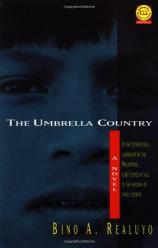Reading Group Guide
Discussion Questions
The Umbrella Country

1. Why do you think the author titled the novel The Umbrella Country? What metaphors were used in the novel for the author to decide on this title?
2. Gringo's family lived during Martial Law, one of the most repressive eras in Philippine history. How do you think the political situation of the times affected the characters' view of the world around them?
3. The novel offers an intense look at family life in the Philippines prior to immigration to the United States. Are these desires and dreams typical of future immigrants? Should countries in the "first world" keep their borders open to less developed countries? How are attitudes toward immigration changing in the United States and the world?
4. The novel begins with the line, "It was the season of sun." Many chapters begin and end with images of the changing weather. How was climate used to describe situations and sentiments of the characters?
5. What anxieties would Gringo and Pipo experience growing up without their mother? More and more, we are seeing single parent households; how is society dealing with these changing family structures? How do you think our definitions of "family" will change in the coming century?
6. Ninang Rola mentioned the United States when she was telling Gringo about the women's liberation in the Philippines. How do you think the women's movement in the United States affects the movements in other countries? How do you feel about social movements in other countries emulating American ones?
7. Sexuality and identity are important themes of the book. How did these differ between the male and female characters of the novel?
8. The novel deals extensively with the adverse effect of homophobia on its young characters. How do you think attitudes about gays and lesbians have changed over the years? How does religion affect these attitudes?
9. Names tell much about a family's history. How did the author use names to reflect the characters, histories, and attitudes of the people? Share the origins of your family name and stories behind it.
10. One of the most important passages in the novel is what Ninang Rola has said a few times, "Certain things are better kept than said." Do you agree with this statement? What are the ironies built around this statement in the novel?
11. In the chapter "Querida Means 'Dear,' " the author gives a look at the life of "other women" in the Philippines. How is this different in your country?
12. How would you compare and contrast the way Gringo and Pipo dealt with the world around them? Are there patterns that foretell the kind of future the brothers will have?
13. The family in the novel eventually immigrated to the United States. How is your idea of immigrants affected by reading this novel? How is this novel different from other immigrant stories you have read?
14. Explore the character of Boy Manicure. What do you think is his most significant contribution to the novel? Would the novel be any different without him?
15. Do you think Ninang Rola made the right decision when she encouraged Germano to find and marry Estrella? Ninang Rola compares the situation to a "rock on a ring, never to be separated again." What are the positive and negative attributes to her statement?
16. In one of the most memorable episodes in the novel, Pipo pushed Gringo away, saying "Run, Gringo, run," only to get himself hit by Daddy Groovie. What does this tell us about the character of Pipo, his inner strengths and weaknesses?
17. If you were to write a sequel to the novel, how would it begin?
18. Estrella is perhaps the most complex character in the novel. If you were Estrella, would you have stayed behind?
The Umbrella Country
- Publication Date: March 2, 1999
- Paperback: 320 pages
- Publisher: Ballantine Books
- ISBN-10: 0345428889
- ISBN-13: 9780345428882







